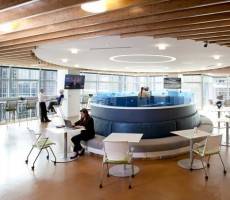October 3, 2014
Julian Assange escapes incarceration to take part in conference as a hologram
[embedplusvideo height=”200″ width=”230″ editlink=”https://bit.ly/1x5tY4Y” standard=”https://www.youtube.com/v/3EjcSc_44vE?fs=1&vq=hd720″ vars=”ytid=3EjcSc_44vE&width=230&height=200&start=&stop=&rs=w&hd=1&autoplay=0&react=0&chapters=¬es=” id=”ep1089″ /]
We have grown accustomed to the way technology distorts time and space. This, after all, is the underlying tension that defines each of the major debates about the workplace, including flexible working, office design, facilities management and the acquisition of commercial property. But, as they say, we ain’t seen nothing yet as the next generation of technologies starts to scale the upslope of the diffusion of innovation curve. People have been talking about telepresence for a little while, but it is about to achieve mainstream awareness thanks to events such as the appearance of Wikileaks Founder Julian Assange at a conference in the USA last week. Assange is famously holed up in London in the Ecuadorian Embassy, challenging his extradition to Sweden to face trial and can’t leave the building without being arrested. So the way he appeared at the conference in Nantucket was as a hologram.























September 25, 2014
Why a more flexible approach to where and when we work is long overdue
by Sara Bean • Comment, Facilities management, Flexible working, News